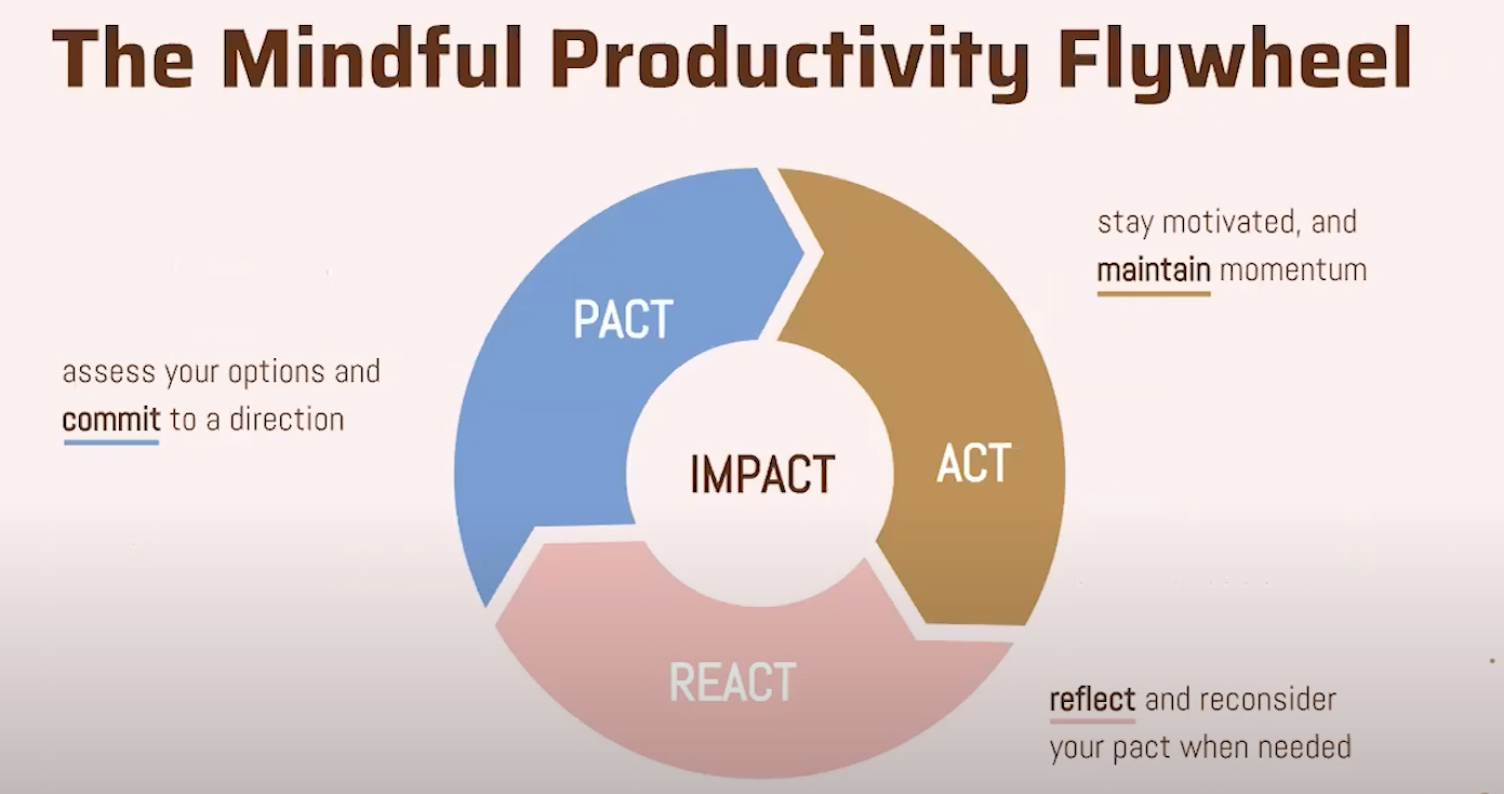Notes from mindful productivity masterclass
[[Mindful productivity masterclass recording|Source]]
Undcertain times and productivity
Toxic productivity
- 3 bad wolves - burnout ➡ disengagement, anxiety ➡ control, uncertainty ➡ pessimism
- explain ways to answer questions
- ask always, we come back
- live-course - to ask & get questions
- fight - flight - freeze
- brain modes
- anxiety, demotivation, choice paralysis, loss of focus, impaired working memory
- stress, decreased cooperations, fear
Mindful productivity
Mindful productivity is being consciously present in what you’re doing, while you’re doing it, in conjunction with managing your mental and emotional states.
- excitement, opportunity, creativity
PARI - Pact - Act - React - Impact
- Pact - accessing your situation, exploring options and committing to a direction
- Act - getting started, staying motivated, and maintaining momentum
- React - is build on Metacognition - Thinking about thinking, look at the me. Reflecting on progress and course correct when needed
- Impact - Reimagine success, reinvent yourself and embrace the squiggly path. Fall in love with the journey
more details: [[Midjourney V6 prompts examples/030-039 Areas/32 Zettelkasten/Literature notes/Matter/The PARI system by Anne-Laure Le Cunff (Ness Labs)]]
Great flywheel to create impact
 Source/attribution: Ness Labs
Source/attribution: Ness Labs
Pact
Personal collection of small units of success which, when consistently repeated over long term, compound to achieve outsized impact.
Purposeful - in right direction to long term aspirations
- Does it move you in the right direction? (relevant to long-term aspirations)
Actionable - focus on outputs
- Does it focus on outputs you can control? … focus on actions you can take today
Contextual - consider accessible resources and information
- Does it take your current context into account? … base it on resources and information accessible
Trackable - did you do it or not
- Does is allow for binary tracking? Is it a yes or no action … so did you do it or not
What is in a pact
Ordered by level of intentionality
- Habits: automatic processes with little/no conscious thought. brushing your teeth
- Routines: Conscious process guided by deliberate actions going for a run
- Rituals: full consciousness and presence in the process meditating (can also be a routine)
Great place to start is to focus on routines. (habits take long, rituals are high on energy demand)
Examples for pacts
- Publish one newsletter every week
- Research one marketing channel to improve each week
- Contact 5 potential partners each day
- Write for 30 minutes every morning
Smart vs Pact
| SMART | PACT |
|---|---|
| Clearly defined outcome | clearly defined output |
| Time end date | Recurring |
| Measurable | Trackable |
| Specific & unambiguous | flexible & contextual |
| achievable target | ambitious journey |
Pact examples
- Publish one newsletter every Thursday for three months (vs. SMART goal end game: Reach 10000 email subscribers by the end of the year)
- Ship one small daily product improvement in November (vs. SMART goal end game: achieve 4.8/5 customer satisfaction by December)
- Contact 5 potential partners every day for 30 days (vs. SMART goal out of you hand: Onboard 10 new partners by the end of the month)
Interstitial journalling
Interstitial journalling consists in writing a few lines every time you take a break, and to track the exact time your are taking these notes.
(break also means, when you catched yourself within a procrastination; after a meeting; along-side, in between other things)
Metacognition
Metacognitive processes include activities such as planning, monitoring, and evaluating one’s own cognitive performance. It involves setting goals, selecting appropriate strategies, monitoring progress, and making adjustments as needed. Metacognition also involves self-awareness of one’s strengths, weaknesses, and areas for improvement.
By engaging in metacognitive practices, individuals can become more effective learners and problem solvers. They can identify gaps in their understanding, recognize when they need to seek additional information or assistance, and make connections between new information and their existing knowledge. Metacognition is an important aspect of self-regulated learning, as it allows individuals to take control of their own learning process and become more independent and autonomous learners.
Session flow notes
Flow from
- Lesson (theory and strategic principles)
- Activity (put principles into practice)
- Case Study (get inspired by others, audio & transcripts)
- Assignment (async homework)
Working with a Wayfinder Mindset
- fall in love with problems - play with questions
- move slow and make things (diffuse mode connection) (instead of move fast & break things)
- design growth loops - use failure to learn
- self-efficacy - individual’s belief in their capacity to act to reach specific goals
Linking
- [[The Pursuit of Excellence The Uncommon Behaviors of the World’s Most Productive Achievers - Ryan Hawk]]
- Notes from Guide Master your 4 pillars of energy
- [[SMART Goals|SMART Goals]]